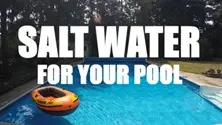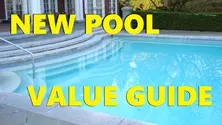How To Make Lightweight Concrete?
SwimmingPoolSteve.com is user-supported. In order to keep this resource about pools and spas available for free to all readers I earn commissions for purchases made through links on this page. For more information see the full disclaimer page. By using this website you are agreeing to the terms and conditions.

How do you make lightweight concrete? The short answer is you take the heavy stuff out of the concrete mix, which would normally be the aggregates sand and gravel, and replace them with a different aggregate that weighs a lot less. This is a pretty dramatic oversimplification since replacing some or all of the aggregates in your concrete mix will substantially change the properties of the mix, most especially the strength. You can pretty much consider concrete weight and strength to be directly proportional in that as you decrease the weight of the concrete with lightweight aggregates you also decrease the strength. So much so that lightweight concrete is pretty rare overall as it is not strong enough for most concrete applications with the exception of decorative or special application concretes.
If lightweight concrete is not really useful for most concrete applications then what are you supposed to do with it? There are a lot of great applications actually but probably the most notable is that lightweight concrete (some lightweight concrete) has an extremely high insulation value. Vermiculite concrete has at least ten times the insulation value of regular mortar or concrete so you could be using a lightweight vermiculite concrete to fill a wall built from stacked cinder blocks. Block walls can be hollow, or they can have steel threaded down into them as well as being filled with concrete for strength. But if you did not need the strength from filling the block wall, as the block wall itself is strong enough, then adding lightweight concrete into the voids would drastically increase the thermal resistance of the wall. For most other applications lightweight concrete is intended for artistic of decorative concrete pieces. While lightweight concrete can potentially be used for structural building applications this would normally require engineering in order to ensure sufficient strength for the application can be achieved.

What are the best lightweight concrete aggregates? - The most common lightweight aggregates for making concrete are going to be perlite and vermiculite. In addition to these very commonly used lightweight aggregates there are also a host of other potential options such as wood shavings, peat moss, styrofoam, pumice, expanded shale, corral, clay, diatomite...many more even.
What is the best lightweight concrete mix?
Lightweight concrete is application specific meaning that there is no single "best lightweight concrete mix" but instead just the best for your specific application. Generally a lightweight concrete mix without any heavy aggregates like sand or gravel would be three or four parts aggregate mixed with one part portland cement. For example you would mix one shovel full of portland cement with either three or four shovel fulls of lightweight aggregates. For most lightweight aggregates this should result in a finished product that is at least strong enough to be self supporting but definitely not strong enough for any structural applications without further admixtures to increase the mechanical properties and strength of the finished product.
If strength is required in addition to lighter weight (or increased thermal resistance) then you can also explore partially replacing the sand and/or gravel with a lightweight aggregate such that you get some benefit from the strength of the full weight aggregates while also getting some benefit from the lightweight aggregates such as increased yield for the mix, as well as increased insulation value.
How strong is lightweight concrete? - Since the mix for lightweight concrete is dependent on the application perhaps a better question would be how strong could lightweight concrete possibly be? "Regular concrete" that you might order from a ready mix concrete supplier might be in the 25 to 35 MPa strength and the ultra high end for extreme engineered concrete is around 400 MPa. Lightweight concrete can be as much as 65 MPa but this represents an engineered mix design and not something the average person can batch up in their garage. For the average enthusiast looking to make some lightweight concrete themselves it is more realistic that you will end up in the 5 to 15 MPa range. If you are unsure just how strong this actually would be the (long) video above includes breaking of 4-1 and 8-2 perlite concrete test bricks to show you just how weak they are.
How to make lightweight concrete stronger? - Instead of replacing all of the aggregates in the mix with lightweight aggregates you could replace only 25% of the aggregates with lighter weight options. This means the mix is still quite strong as 3/4 of the normal concrete aggregates are present. But if you are looking to move away from full weight aggregates completely then it might be a good idea to modify the concrete mix recipe with admixtures. Specifically lightweight concrete has a very low tensile strength which is something even full strength concrete is lacking as well. The addition of chopped glass fibers or fiberglass to the lightweight mix will help to increase the overall strength. Addition of PVA (poly vinyl acetate / white glue) to the mix will also improve the strength of the finished lightweight mix. Replace at least 10% of the water in your mix with a modified PVA product and this will further bind the aggregates together and increase the sheer strength and compressive strength of the mix. Finally, you can make your lightweight concrete thicker to increase strength.
Experimenting with lightweight concrete is fun and there are a lot of different mix designs that you can try. Generally you will want to wet down your lightweight aggregates before using them in your concrete mix. Many, especially vermiculite, hold a tremendous amount of water which means that if not pre-wetted you will find that the lightweight aggregates bind the mix as they steal away all the water from the concrete you are trying to mix. You also want to be aware that when you are batching lightweight concrete mixes with a mortar mixer or concrete mixer that you want to spin the lightweight aggregates for as little time as possible. This is a little contrary to how normal concrete is mixed as normally more mixing is better. If you over spin or over mix vermiculite, perlite or many of the other lightweight aggregates you will find they break down and the volume of your batched yield will decrease significantly.
Top content from www.SwimmingPoolSteve.com
Pool and spa chemistry crash course
New pool owner guide
The Swimming Pool Steve blog
Have a question - ask Steve

Swimming Pool Steve is an award winning, second generation swimming pool specialist from Ontario Canada and one of the most trusted voices in the swimming pool industry. With over 20,000,000 views on the Swimming Pool Steve YouTube Channel, winner of the Pleatco Pool & Spa Industry Leadership award and author of hundreds of pool and spa articles both online and in print. Steve is committed to helping pool and spa owners as well as pool and spa industry workers learn more about the technical side of building, renovating, repairing and maintaining all types of swimming pools and spas. Follow Swimming Pool Steve on Facebook, Twitter and YouTube.
Paid PDF Books From Swimming Pool Steve
 Steve's Pool Survival Guide
Steve's Pool Survival Guide
The Swimming Pool Steve Pool Survival Guide is intended to help pool owners understand their pool and pool equipment better, understand water chemistry, water testing and chemical corrections to the water, troubleshoot the most common pool problems and have confidence in interacting and caring for their pool in the fastest possible frame of time. Also covers pool safety, things to avoid and how to operate your pool more efficiently.
 Salt Water Recommendations
Salt Water Recommendations
Are you considering upgrading to salt water in your pool? In this paid PDF Steve talks about which pools should avoid using salt water. Find out concerns about using salt in your pool but also the potential benefits of salt water. Finally hear which specific brand and model of salt chlorine generator Steve thinks is the best option currently available to pool owners and how to choose the right size salt system for your pool.
 New Pool Heater Buyer's Guide
New Pool Heater Buyer's Guide
In this guide Swimming Pool Steve will help you to better understand your heater options as well as which would be best suited for your pool. Learn about BTU output and sizing of both gas/propane heaters as well as electric heat pumps for residential swimming pools. You will also learn about which specific brands and models of currently available pool heaters Steve likes to recommend. If you are thinking of adding a new pool heater to your equipment pad this buyer's guide would be a useful resource to help you make a more informed buying decision.
 New Pool Installation Value Guide
New Pool Installation Value Guide
This is a value shopping guide written by Swimming Pool Steve to help home owners hiring for a new pool installation to get the maximum value for their investment with tips about how to protect your interests during the vetting, hiring and pool installation process. Anyone serious about having a pool installed will find value in this guide. Pool installers will sell the pool package that is best for them - not for you! Become an informed value shopper with this PDF guide.
Endorsed Brands From Swimming Pool Steve
The following links and products are to affiliates of the Swimming Pool Steve website. These are brands, products and services hand selected by Steve for endorsement. Please note that these endorsements can include monetary compensation, affiliate links and referral fees to Swimming Pool Steve, however there is zero additional cost to you should you use one of these products or services. Income generated from these links helps to keep this pool and spa resource available for everyone. To have your product or service considered for listing here as an endorsed brand email SwimmingPoolSteve@gmail.com.
Amazon Disclosure Statement - As an Amazon Associate I earn from qualifying purchases.

www.PoolPartsToGo.com
New Black + Decker variable speed pumps are available online from www.PoolPartsToGo.com and they are a drop in replacement for many popular pump models including Pentair Superflo and Hayward Super Pumps. With an adjustable platform base, union connections included and a very strong warranty these pumps offer an impressive value to pool owners.
- Swimming Pool Steve
